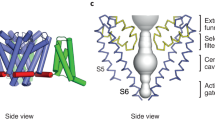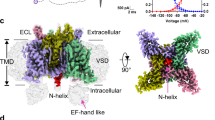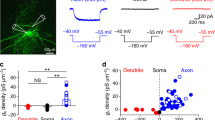Abstract
Sodium channels in nerve and muscle cells are functionally similar across wide phylogenetic boundaries1 and are usually thought to represent a single, homogeneous population that initiates the .action potential at threshold and unerringly transmits it along the surface membrane. In marked contrast, many cell types are known to have several distinct potassium permeability systems2,3. Distinguishable populations of Na channels have been reported in a few cell types, however, including denervated skeletal muscle4, embryonic cardiac muscle5, Purkinje cell somata6and non-myelinated axons at low temperature7. We report here that in squid giant axon, in standard experimental conditions, there are two functionally distinct populations of Na channels. The newly discovered population accounts for only a few per cent of the total Na permeability. The channels are selectively activated by small depolarizations and have very slow closing kinetics. Because these channels activate at voltages near the resting potential and tend to stay open for long times, they must dominate behaviour of the axon membrane in the threshold region for action potential initiation.
This is a preview of subscription content, access via your institution
Access options
Subscribe to this journal
Receive 51 print issues and online access
$199.00 per year
only $3.90 per issue
Buy this article
- Purchase on Springer Link
- Instant access to full article PDF
Prices may be subject to local taxes which are calculated during checkout
Similar content being viewed by others
References
Hagiwara, S. Membrane Potential-dependent Ion Channels in Cell Membranes: Phylogenetic and Developmental Approaches, 118 (Raven, New York, 1983).
Thompson, S. H. & Aldrich, R. W. in The Cell Surface and Neuronal Function (eds Cotman, C. W., Poste, G. & Nicolson, G. L.) 49–85 (Elsevier, Amsterdam, 1980).
Dubois, J. M. J. Physiol., Lond. 318, 297–316 (1981).
Pappone, P. A. J. Physiol., Lond. 306, 377–410 (1980).
Ten Eick, R., Yeh, J. & Matsuki, N. Biophys. J. 45, 70–73 (1984).
Llinas, R. & Sugimori, M. J. Physiol., Lond. 305, 197–213 (1980).
Mattesen, D. R. & Armstrong, C. M. J. gen. Physiol. 79, 739–758 (1982).
Armstrong, C. M. & Bezanilla, F. J. gen.Physiol. 63, 533–552 (1974).
Armstrong, C. M. & Gilly, W. F. J. gen. Physiol 74, 691–711 (1979).
Hodgkin, A. L. & Huxley, A. F. J. Physiol, Lond. 117, 500–544 (1952).
Gilly, W. F. & Armstrong, C. M. J. gen. Physiol. 79, 935–964 (1983).
Oxford, G. S. J. gen. Physiol. 77, 1–22 (1981).
Moore, J. W. & Westerfield, M. J. Physiol., Lond. 336, 285–300 (1983).
Moore, J. W., Stockbridge, N. & Westerfield, M. J. Physiol., Lond. 336, 301–311 (1983).
Author information
Authors and Affiliations
Rights and permissions
About this article
Cite this article
Gilly, W., Armstrong, C. Threshold channels—a novel type of sodium channel in squid giant axon. Nature 309, 448–450 (1984). https://doi.org/10.1038/309448a0
Received:
Accepted:
Issue Date:
DOI: https://doi.org/10.1038/309448a0
This article is cited by
-
Theoretical studies of impulse propagation in serotonergic axons
Biological Cybernetics (1992)
-
Kinetic evidence for two Na channels in frog skeletal muscle
Journal of Biological Physics (1990)
-
Amplification of small signals by voltage-gated sodium channels in drone photoreceptors
Journal of Comparative Physiology A (1989)
-
Rate of opening of a population of Na channels in frog skeletal muscle fibers
Journal of Biological Physics (1989)
-
Two open states or two different Na channels in skeletal muscle fibers: Markov models of the decay of Na currents in frog skeletal muscle
Journal of Biological Physics (1988)
Comments
By submitting a comment you agree to abide by our Terms and Community Guidelines. If you find something abusive or that does not comply with our terms or guidelines please flag it as inappropriate.



